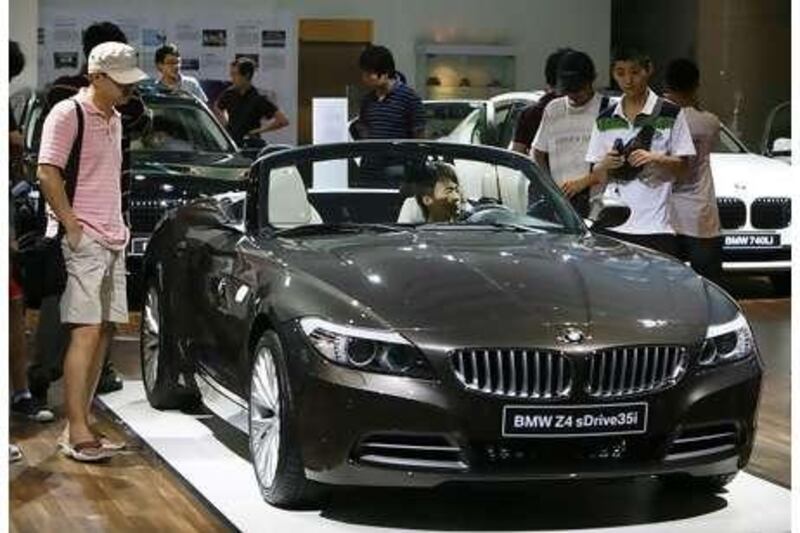The market for luxury cars in China is growing at a stratospheric rate. While the Middle Kingdom's vehicle sector has expanded briskly this year, with sales up 52 per cent in the first six months to 5.7 million cars, the premium segment has been growing even faster in percentage terms.
In the first half of this year, the German maker Mercedes-Benz shifted 60,000 cars, a 120 per cent increase on the same period last year, while its arch-rival BMW made 71,000 sales, doubling sales for the first half of last year. The leader of the luxury pack in China, Audi, enjoyed a two thirds jump in sales from January to the end of June, reaching almost 110,000 units. Lin Huabin, a senior motor industry market analyst for IHS Global Insight in Shanghai, says the luxury car sector in China is growing so fast partly because it is expanding from a small base, relative to the total size of the country's motor industry.
The increase in premium sales also reflects China's "tremendous increase in economic development". "This year [economic growth] is about 10 per cent and the incomes are growing faster, so that's a reason," Mr Lin says. Car buyers in the UAE will readily identify with the enthusiasm of Chinese buyers for a bit of luxury as premium brands also post healthy sales in the Emirates, but the names of the vehicles are often very different.
In the GCC, Toyota's upscale sibling Lexus is a king of the luxury sector with its SUVs and saloons a common sight. Toshio Furutani, the senior managing director of Global Lexus, said late last year that the marque was "consistently posting number one or two" in luxury sales in the GCC. How different the situation is in China, where Lexus trails its German rivals by a wide margin. Three years ago the company was talking about achieving 40,000 annual sales in China but last year only 33,000 cars were driven off the forecourts of its dealers in the country, barely an increase on 2008, despite Audi, BMW and Mercedes registering significant growth in China last year.
This year, too, has proved difficult, with Lexus having announced this month it would recall almost 6,000 vehicles sold in China because of an engine problem. The other prestige Japanese brands are having an even harder time. Acura, Honda's upmarket brand, and Infiniti, the luxury arm of Nissan, each only sell a few thousand cars a year in China, barely enough to register on the radars of their more successful rivals.
So why has the going been so tough for the Japanese luxury car makers in China when Lexus in particular has become so popular compared with its much older European rivals in markets such as the Gulf? Certainly, the enormous popularity of Toyota in the UAE, where the Japanese brand holds the number one sales position, is likely to have aided Lexus's position in the Gulf. But in China, car buyers in general do not show the enormous enthusiasm for all things Japanese and North American of their counterparts in the UAE. The market-leading brand in China is Volkswagen and that, no doubt at least partly, explains why Audi, its prestige partner brand, is so popular in the country.
Mr Lin describes motorists from the world's most populous nation as tending to be "more geared to the European styling and German image". John Zeng, another automotive analyst with IHS Global Insight, believes changes in the balance of economic power within greater China in part account for Lexus's modest fortunes. "Lexus used to have quite a good reputation, especially in the south part of China, in the 1990s. This was mainly because many [people from Hong Kong] loved Lexus," Mr Zeng says.
"In the 1990s, what Hong Kong people were doing had a huge influence on mainland people. Now, because the influence of Hong Kong has become weaker and weaker, people in the mainland don't care what cars the Hong Kongers are driving. It's a cultural phenomenon." Another factor is simply that the Japanese luxury marques came late to China. Lexus began sales there as recently as 2005, followed a year later by Acura, and then another year later by Infiniti. By contrast, BMW began actually making cars in China in 2003.
This dedication to building cars in China is another factor in favour of Audi, Mercedes and BMW, which crank out tens of thousands of their smaller models each year in Chinese factories. While Toyotas, Nissans and Hondas are made in China, vehicles from their upmarket sister brands are not. Lexus has been talking publicly for several years about manufacturing in China but the production lines have yet to start.
It may have launched as many as six new models in China last year but Mr Zeng believes in the absence of local production there is a limit to what can be achieved, partly because of import duties. The marque, he suggests, should be undercutting its rivals. "They're pretty much at the same price as BMW or Mercedes in China but people don't regard them as [being] as luxurious as [those two brands]," he says.
It will take "some time" for Lexus to catch up with the European luxury car makers in China, says Mr Lin, while Mr Zeng thinks the other Japanese luxury car models have an even bigger mountain to climb, partly because "not many people know" them. "The situation has become more and more difficult because Audi, Mercedes, BMW and Volvo have very aggressive local production plans so they can reduce their price and make their portfolio more available to the general consumers," Mr Zeng says.
"It's going to be even more tough for the Japanese brands to catch up." dbardsley@thenational.ae





